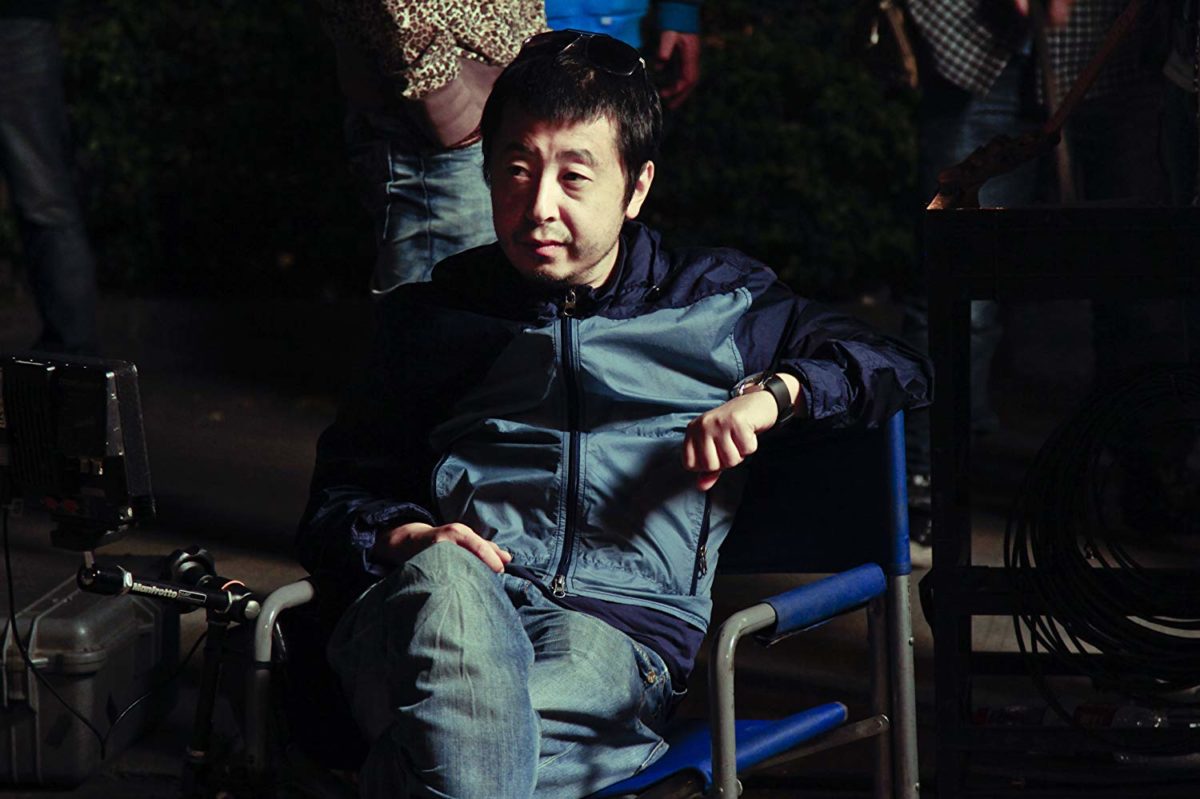To take stock of a filmmaker it is often beneficial to look at their extracurricular pursuits. If there are any. For mainland Chinese filmmaker Jia Zhangke, there are not just any but many as a quick peruse of a year or two from his appointment book would reveal enough ventures, outreaches and initiatives to occupy a lifetime, or more. Take 2016 and 2017, for example, and you’d find the opening of a noodle restaurant and his election as a delegate to the National People’s Congress -where he is involved with legislating China’s ballooning film industry. He also founded an arts centre in his home town of Fenyang, a film festival in neighbouring Pingyao and completed his sophomore collection of essays.
An acceptable first impression, after seeing all of this lined up one after the other, would be that this hive of entrepreneurial activity has arose in response to a career break. That Jia Zhangke, as a filmmaker, has been inactive. Yet looking at his body of work over the same stretch of time reveals no dearth but instead a new production company, production credits on a handful of debuts and second features and a panoply of masterclasses and other film-related public appearances. In terms of projects where Jia was the director, there is his 2016 short, The Hedonists, a segment in the 2017 anthology, Where Has The Time Gone? and pre-production, along with a sizeable chunk of a multi-season shoot, for his newest feature, Ash Is Purest White. This latest film is an epic that begins in the skin of a John Woo and Johnnie To inflected gangster epic, until Qiao (Zhao Tao) saves her lover Bin (Liao Fan) from an ambush by firing a gun, an act that lands her behind bars for five years and sets the film on a less classifiable course.

Its timeframe — 2001 to 2018 — aligns it with his previous feature, Mountains May Depart (2015), in that they are both melodramatic extrapolations of the cultural and political currents at work in Mainland China in this young century. Jia has always been obsessed with the state of the nation and has previously made works that are contemporary set and others that have reeled in the years. Yet this hinging of a grand historical approach onto a greater emphasis on personal relationships and the present is a new development, along with the overt reliance that both films, especially Ash Is Purest White, have on motifs, images and entire sequences and narrative frameworks culled from his earlier work, employed in a fashion that is so explicit that they go beyond mere reference and instead shapes the very meaning of his 21st century work and Jia himself, as an artist then and now.
The impetus behind this shift in thought and practice can be found, in part, in all the aforementioned brand building. For at the time of writing, Jia seems to be at the zenith of his career, when it comes to recognition — in China and abroad — and to his commercial prospects, given that Mountains May Depart was conjured from his biggest budget and given his widest release. Until Ash Is Purest White came along. He is self-aware too, about being a rare case, a sole individual who seemingly dominates their country’s film culture. Or at least one who has managed to separate himself from it and operate within his own sphere. There are other examples but few, or none, connect. No one, currently, seems to have his self-consciousness either, a trait which seems to be a bi-product of having to spend your twenties learning to navigate and cultivate a place in a cultural climate where signifiers such as ‘independent’ and ‘mainstream’ had, and have, far reaching implications when it comes to an artist’s creative and professional person and the life and reach of their work.
The Past Inside the Present
Jia’s path to the present was innately political. As a Chinese filmmaker who was born in 1970 and started making his first feature in 1997, he just happened to be alive and conscious smack dab in the middle of a moment of transformative Chinese history, in which a measured yet unprecedented opening of the Mainland’s cultural borders — a general relaxation which has its roots in the early 1980s — had a direct, and seismic, effect on the outlook of filmmakers who emerged in the 1990s. It exposed them to influences and — thanks to the birth of low-cost digital filmmaking — a flexibility that was hitherto unprecedented. These filmmakers were dubbed the 6th generation and its numbers were made up with graduates from the Beijing Film Academy, where they were followed a curriculum composed of long suppressed local classics such as Fei Mu’s Spring In A Small Town (1948) and Xie Jin’s Two Stage Sisters (1964)Both films were featured in Jia’s 2010 documentary I Wish I Knew, in which, as per Jia’s legacy building, he places them in a lineage at the end of which he implicitly places himself via the spectral presence of Zhao Tao, his, by then, muse and, later, partner., as well as world cinema titans such as two of Jia’s key early influences: Robert Bresson and Michelangelo Antonioni. Drawing from these influences and their own experiences, almost all of these filmmakers, from Lou Ye to Wang Xiaoshuai and, of course, Jia Zhangke, granted themselves a remit which included a commitment to unglamourised depictions of contemporary Chinese life, creative independence and critiques of the censorious — and therefore risk adverse — mainstream industry.
It is key to understanding Jia’s stature as a filmmaker today — how his legacy actively influences the creative and commercial decisions that he makes — that not only did he hold a prominent place within this rebellious generation but that he also was the Chinese filmmaker most given to explication. In the essays collected in the appropriately titled, Jia Zhangke Speaks Out (2015), he ruminates on and illuminates not just his creative process, but other subjects that filmmakers from all over generally go out of their way to avoid expressing an opinion on, from the tectonics of the industry — its vagaries and prejudices — and the influence that certain other filmmakers hold in the industry to his own position in relation to all three.
As he has gotten older, many of his positions have changed. For example, Zhang Yimou, a 5th generation giant, and veteran of the festival circuit in the 1980s, who became a markedly more commercial filmmaker in the 2000s, is singled out and castigated in one of the most pugilistic of Jia’s early essays. And yet years later his old enemy makes an evocative cameo appearance in I Wish I Knew, where he briefly accompanies Zhao Tao. It is a reversal that, along with several other moves that he has made over the years, has provoked calls of hypocrisy, when their possibly conciliatory tone is compared to the more combative person he was in his more formative years. Yet regardless, this doubling back in terms of his work and the way he conducts himself is fundamental to how Jia functions as an artist. For he would not have been able to build his multivalent cottage industry if he had not, controversially, started submitting his films to censorship. A necessity for achieving a Chinese theatrical distribution of any scale since a film’s release is blocked unless it is ‘approved’.
Neither would his work have the same scope if he had not abandoned the very strict conception of realism found in his early work. Since The World (2004), he has expanded his toolkit to include animation, surrealism, documentary and, most recently, genre elements from gangster movies and melodrama. It speaks of an artist who is not only mobile but moves according to the demands of his own personal development and that of his subject; the twists and turns of mainland Chinese society. Now that he has a legacy — that he has been mining even in his non-filmic work for his restaurant is named after Mountains May Depart and the competition section of the Pingyao festival after Platform (2000) — he has been utilizing it, especially in his two most recent works, by adapting prior treatments on particular subject, in collusion with changes in the now middle aged Jia’s emotional life. The results is an artist who is willing to directly reconfigure his past work in order to deduce the state of China today via its similarities or disparities to its past.
In an interview for Film Comment, Jia expounds on the source of Mountains May Depart and the liberties taken, in relation to what has come before. The film germinated with a change in perspective on his mother. Not only did he recognise her loneliness after his father had passed away and all of her children, including Zhangke, had fled the nest, he empathised with it. According to Jia, this led to the realization that in his peripatetic search for a filmmaking career and the independence that he sought as a young person, he had been blind to her emotional life. He directly addresses this quagmire through Zhao Tao’s role in the film, which starts as a peppy twenty something caught between two suitors. If in the first part, the whole wide world is ahead of her, in the second, it has left her behind, as the film jumps to 2014 where her mid-life is defined by a litany of losses, from an off-screen divorce to the death of her father to the departure of her pre-teen son, with whom she is granted one last weekend before he emigrates with his father to Australia. In depicting this relationship to such an intimate degree, Jia addresses the change within his sensibility through the film’s parallels to his more detached second feature Platform, from which it adapts the structure of observing the change wrought on a select group of characters over a long and tumultuous span of time. He was prompted by the above realization to further explore the divide between children and their parents that was also played out in that older movie.
In Platform, this divide is less emotional and more political and cultural, as represented most pithily in a scene where the main character, Minliang (Wang Hongwei) is interrogated by his Mao suit wearing father about the name of the strange garments wrapped around his legs. The answer is ‘bellbottoms.’ It is a dynamic that was born out of the stage that Jia was in as a filmmaker, when his interest lied in crafting characters whose emotions are obliquely presented and in a form that committed to long shots and long takes, where the characters’ emotional states are purposely side-lined or outrightly obscured. The key examples of this are the scenes where Minliang and Ruijuan (Zhao Tao) meet and discuss their relationship; their bodies, and so the details of their relationship, are drowned out by the distance and overwhelmed by the ancient walls of Fenyang. It is also the natural inclination of a creative, young man — Jia was 29 during production — to focus in on other creative, young people rather than their parents. The former’s and his concerns lie less in the ability to reconcile with their progenitors and more in the difficulty, and eventually for some the impossibility, of keeping on the path towards achieving and maintaining your passions through a society in transition. It is why Platform, as a film that starts in 1979 during the waning days of Maoism and then continues and ends in 1990 in the middle of a Deng Xiaoping induced move towards a more capitalist, market economy, begins with a political timestamp: a loudspeaker declaring that Lin Biao — a former Yuan Shuai (army marshal) whose ousting as a traitor preceded his mysterious death — has been rehabilitated. The first in a trickle of reorientations that will eventually send the members of the travelling cultural troupe in which Minliang performs (and around which his life revolves) off on a course that was never intended.

Then there is the equivalent scene setter in Mountains May Depart. A bevy of fireworks exploding, followed by Tao (Zhao Tao) being sideswiped by a group of revellers dressed in a dragon dance costume. It is Chinese New Year, an event that points to Mountain May Depart as being less concerned with specific period politics, and more with broad cultural symbols and how societal shifts, borne and amplified by the passage of time, can threaten to erase the very culture that produces these symbols. This becomes especially pressing at the end of the second part, where Tao cooks her son dumplings and encourages him to study the process closely, out of the fear that not only will he will grow up with no strong memories of her but also that he will lose touch with even the most fundamental traditions. This is not a film married to a period of clearly defined cultural change but rather one that borrows the same treatment as Platform but revises it, in this case, to address the fear that any sort of culture will survive when subjected to the slow erosion, and atomisation, of 21st century global capitalism.
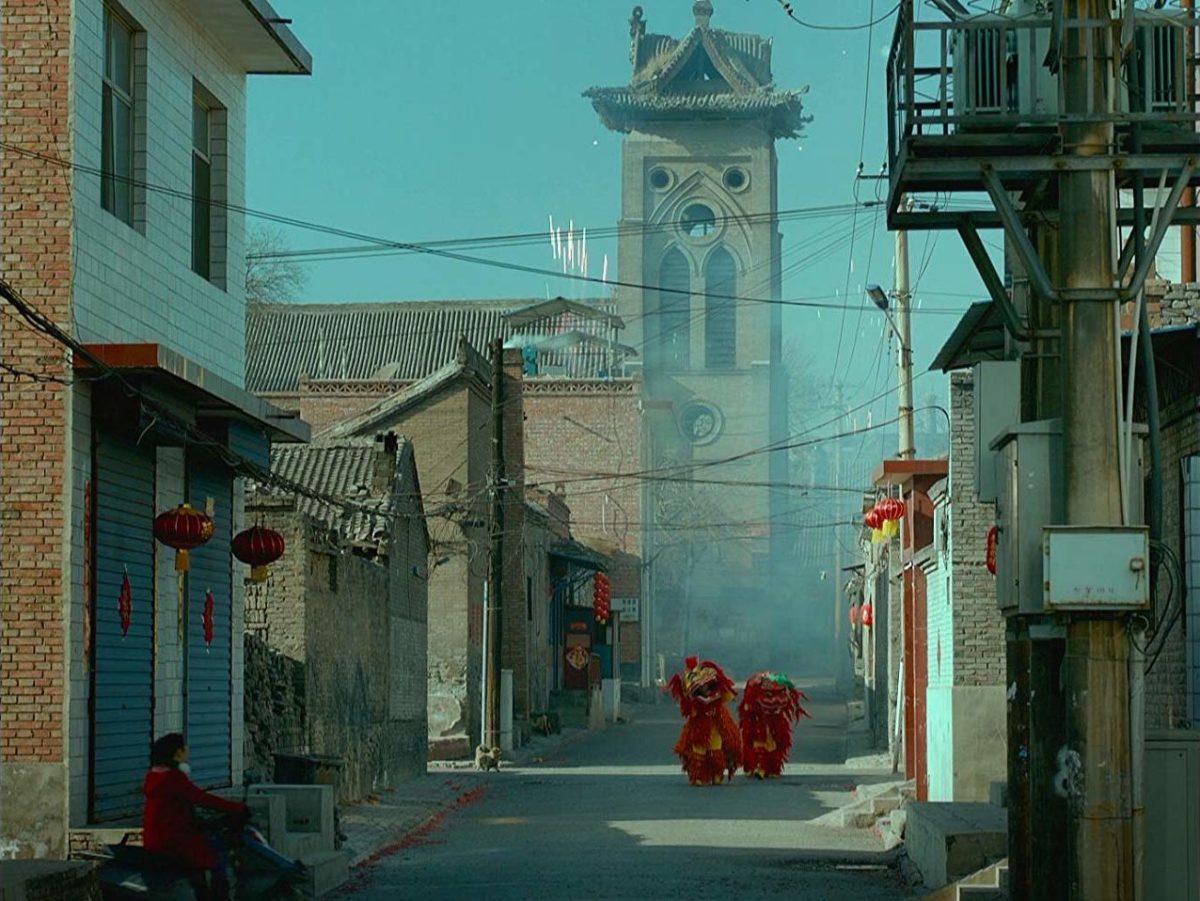
Mountains May Depart but Our Hearts Will Remain the Same?
If Mountains May Depart is more straightforward in its mimesis, in that it is one work talking directly to another, then Ash Is Purest White is stranger in that absorbs multiple works that manifest, disruptively, like ghosts that are summoned by a call back to a particular scene or gesture.
The first is triggered by a scene where Qiao (Zhao Tao) and Bin (Liao Fan) are in the club dancing to The Village People’s ‘YMCA’. They seem to be having a good time until a gun hits the floor. Bin has accidentally dropped it in mimicry of a scene in Unknown Pleasures (2002) where another Qiao (also Zhao Tao) is dancing with her boyfriend San (Li Shubin), another pair of butterfingers. He is also Bin’s doppelgänger, as they are ostensibly in the same line of work, yet where Bin is suave and sexy and compassionate towards his underlings in his adherence to a code of honour, San is callow and cruel. An opportunistic, little man who goes about his work minus any of the accoutrement or equalitarianism of the JianghuJianghu is a complex term that refers to the traditional Chinese criminal underworld and its customs and norms.. Instead he’s got a plain, striped shirt tucked into his pants with a folder perpetually tucked under his arm and a ‘every man for himself’ cosmology that is evident in his every word and deed.
In the context of Ash Is Purest White, he is Bin, or rather Bin’s lifestyle demystified, yet despite the scene that is directly referenced and the character connection that is suggested, when ‘YMCA’ starts up for a second time, what we actually see is a brief cutaway to the protagonists of Unknown Pleasures, working class drop outs Bin Bin and Xiao Ji. This time it retrieves a confluence of inspiration and aspiration shared by the duo and Bin and his gang, since they both watch similar sort of movies and their viewing influences the way they navigate their worlds. For Bin, it is action films from Hong Kong and he has the money and wherewithal to live out that fantasy. On the other hand, Bin Bin and Xiao Ji, traversing the yawning void that is spending one’s late teens in a depressed, little town, are out of luck. They can only re-enact their influences in short bursts, such as the scene where Xiao Ji is sitting in a diner with Qiao. He hits on her with what he knows: a description of a scene from a movie he watched last night. He doesn’t mention the title, but it isn’t difficult to deduce that he’s talking about the opening scene of Pulp Fiction (Quentin Tarantino, 1994). One of several things caught on TV — including the announcement of the 2008 Olympic Games, then still 6 years in the future — that are so out of reach that it jars in juxtaposition to the monotony of their dead-end existence, and so pushes them towards a Jianghu-like act that is so incompetently handled that it would be hilarious if the consequences weren’t so catastrophic. But before all of that, Jia finishes off Xiao’s description with a then uncharacteristic stylistic flourish; a whip pan as Xiao swings around and pretends to fire a gun and then a smash cut to the club and the original dropping of the gun.
After its first act, Ash Is Purest White leaves behind Unknown Pleasures, but the damage has been done. Or has it? It depends on who is watching. It could be argued that the film in general favours one sort of viewer over the other. Someone versed in Jia’s filmography over someone coming to his work for the first time. Yet even setting aside that the work on a whole contains enough avenues and frissons in its two and half hour runtime to allow the occasional inscrutability to pass by, the five second detour — from the primary colours of the club to the desaturated palette of Unknown Pleasures — is so incongruous that it will not only jar the uninitiated but in the change of palette and setting also suggest that there is another layer of reality underneath. For those who are seasoned, this moment, along with all the other call-backs that accompany it, becomes a dense little loop of direct and indirect associations working its way at undermining this romanticised version of the Jianghu while also predicting its end, announced with the firing of that very same gun.
What we get in its stead isn’t exactly reality. There’s no return to the despiritualised digital of Unknown Pleasures but instead we get an excursion into another film. One that was shot in DV but on the rebound it is re-enacted in sun soaked 35mm — making Ash Is Purest White the first Jia film to feature the format since Platform. The film reconstructed is Still Life (2006), which places a dual narrative in the city of Fengjie during its then ongoing disassembly to make way for the construction of the Three Gorges Dam. Its remake in miniature operates out of an impulse that Jia elaborated on in another interview for Film Comment, about the inception of Ash Is Purest White, which, among other inspirations, included Jia rewatching both Unknown Pleasures and Still Life and noticing a continuum between Zhao Tao’s performance in the former and in the latter. A third entry is formulated in Ash Is Purest White when the film jumps from 2001 to 2006, whereupon Qiao’s search for both Bin and her own rediscovery places herself inside a midsection recreation of Still Life. For after she is released from prison she takes a ferry up the Yangtze to the city of Fengijie, dressed in the same yellow shirt while wielding the same water bottle and waywardness as she did in the latter movie.
Yet despite this extended spell of déjà vu, this continuum is maintained and added upon more in the disparities between Qiao and her antecedents. In Still Life, Zhao’s character drifts through the Three Gorges region with the same goal in mind as Qiao, but without forming a connection with the place or its people despite having to consistently rely upon them to reach her objective. Qiao on the other hand, has to be constantly aware of and interacting with her environment and its denizens in order to be able to manoeuvre and grift her way to towards her goal, and then beyond that, to an independence that the old Qiao, from Unknown Pleasures, lacks from beginning to end. This turn towards the resourceful then not only comes across as an addition to and a retrospective on Zhao Tao’s persona but also a celebration concocted through cross-examination.
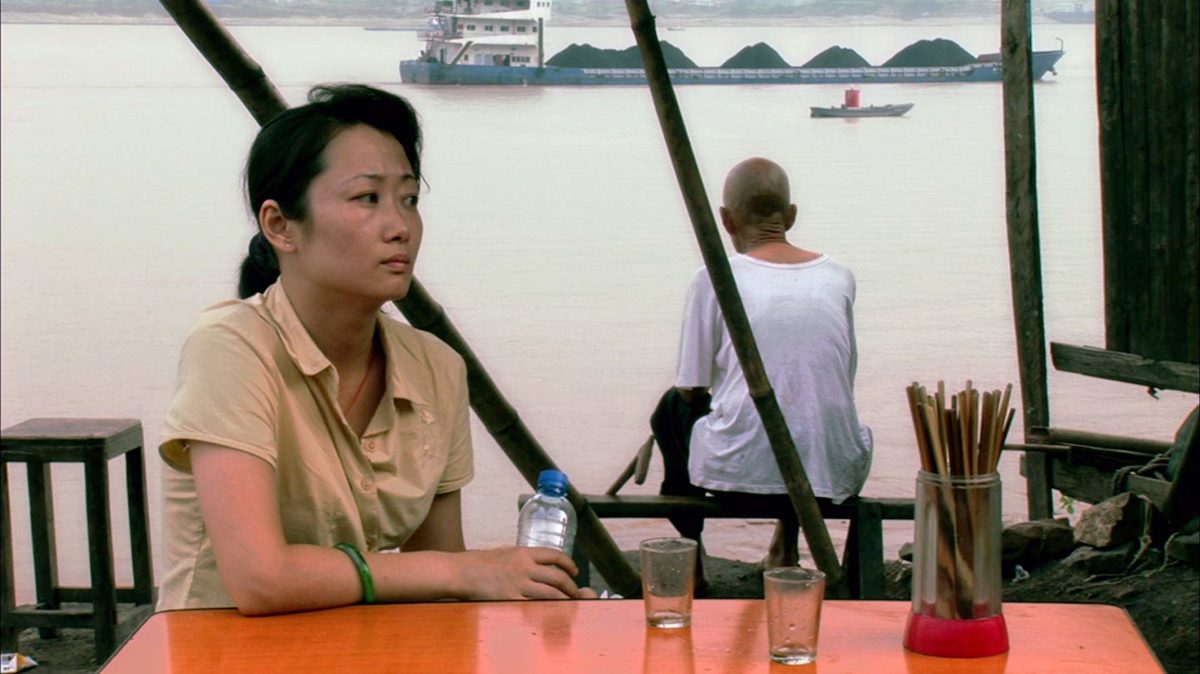
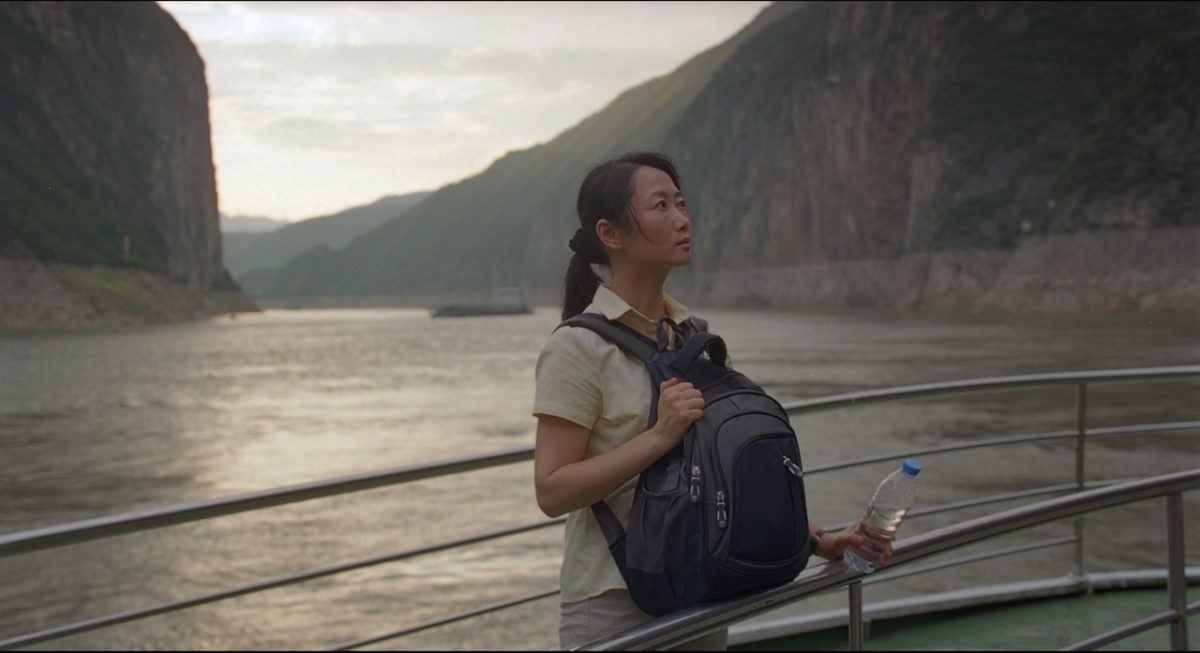
Nostalgia And The Brothers Ford
Though there may be no figure that directly mirrors Jia Zhangke — initiative to initiative, film to film — there is a usefulness in looking at how the creative act of reprocessing can be found throughout cinema, proliferated in many forms, all of which affirm Jia’s uniqueness but not only through difference. Occasionally there is an example that chimes and in doing so highlights the particularities of Jia’s method of looking back in order to look at now. Though first there are examples that wildly diverge from Jia in both intention and practice, the former largely motivated by commercial concerns and the latter originating in a Hollywood that reassures those concerns by refamiliarising the familiar, or by making the unfamiliar familiar in cases where ‘foreign language’ thrillers and horror films are remade in English, often with the same director attached.
That is not say that reuse, as a tool of an auteur, is impossible in an industrialized setting. Many examples were fashioned — or rather refashioned — during the Classic Hollywood era, where its production mill like system meant that certain directors amassed vast filmographies which could include one, or more than one, ‘auto-remakes’, which is where a filmmaker makes the same film twice. Alfred Hitchcock did it with The Man Who Knew Too Much, first in Britain in 1934 and then in the States in 1956. Raoul Walsh as well, with 1941’s High Sierra, which eventually found its way into the form of Colorado Territory, released in 1949. Both these instances were one-offs in a sense, their directors having never repeated a film so explicitly ever again.
You could say the same about Howard Hawks too, if you don’t read between the lines. For though A Song Is Born (1948) was his only direct remake — as it is an adaptation of Ball of Fire (1941) — Hawk’s career is, more than most, the result of an accumulated repertoire of character types and narrative tricks, used time and time again. Though never done so self-consciously with the intent of building a legacy, for Hawks found it hard enough to think of himself as any sort of artist at all. Never mind one that works on such a grand scale. Rather it is an approach that takes on one film at a time. Like a jazz musician who has a couple dozen standards tucked away in their back pocket, ready to be deployed if needs be, Hawks repeats elements to make an individual film, or performance, better, rather than as a means of hearkening back.

There’s another set of twins whose author, at large, intersects with Jia more than the actual texts themselves do, which happen to be Judge Priest (1934) and The Sun Shines Bright (1953), both of which are directed by John Ford and tell, with some variations, the story of a judge caught up in a case that has set alight his small southern town’s racial and social prejudices. The Sun Shines Bright was made as part of a multi-picture deal with Republic Pictures, out of which the title in question was the most neglected by the studio. Funding was delayed, the budget was reduced, and the premiere was downgraded. In short, the studio considered its commercial prospects as nil. Dead on arrival. Ford, on the other hand, was committed because it was a passion project — that would ultimately become one of his personal favourites — born out of his fondness for the material, for the original star, the late Will Rogers and, tying in with the former, it was chance to recreate and re-examine the same subject with the extra perspective that he had then in his possession as a 59 year old, that he didn’t have when he was 40. Yet, looking at Jia’s and Ford’s career-long preoccupations, both begin to resemble one another. Perhaps not so much on a formal, film to film, level but rather in their identities as a deeply political artists, committed to delineating and exploring the national character as it is formed, or in the case of Jia still being formed, by seismic, dialectical forces as alive in the past as they are in the present, their depictions deepened, not made vague or void, by their ideological ambiguities.
For Ford this manifests itself in a clashing, or rather a dance, of sensibilities that draw equally from the left and right. Such as in Fort Apache (1948), which threads a deep-seated adoration of cavalry life — the routine, the dances, the horseplay, its pecking order — while castigating its leader, the vain and immobile Captain Thursday (Henry Fonda) and how his intolerance and pig-headedness wins him an immortalisation at the cost of death for him and oblivion for his men. This could be put down to the practice of working with writers and producers of many different stripes and colours — in the case of Fort Apache, its scribe, Frank Nugent, was a liberal — but Ford himself is too complicated a man. He allied himself with democratic socialism and conservatism at different points in his life, while largely plumbing the gaps in between in search of historical and contemporary incidents and personages where the two, or more, come into conflict, and what sort of a country comes as a result. Jia on the other hand is a modernist obsessed with tradition, who meets its passing with a mixture of scepticism and, especially in the case of Mountains May Depart, outright lamentation. But where does this ideological diffuseness come from? It could be in the disparity between their points of origin and where they ended.
For Jia, it was a borderline impoverished upbringing in Fenyang, the main city in the relatively provincial province of Shanxi. Hardly a cultural centre, as its chief concern and product is coal. While for Ford it precedes his adolescence, or even his birth, and instead lands somewhere during his parents’ upbringing in a village called Spiddal, located in what has long been Ireland’s most depressed region. So much so that it is was the inspiration for the infamous Cromwellian dictate ‘To hell or to Connaught.’ John and Barbara Ford chose a third destination, Portland, Maine, where in the seaside suburb of Cape Elizabeth, where their son among many, John who was born soon after their arrival, was raised on the wages of an immigrant bartender and in a racially and ethnically diverse neighbourhood. A far cry from the fame and fortune he found in segregated Hollywood.
Yet it was not enough for of either of them to just draw on these sources ambiently. They have to see to it that they live and breath on screen. In Ford, they are made flesh in his celtic films, such as The Quiet Man (1952), How Green Was My Valley (1941) and The Rising Of The Moon (1957), and more consistently in his ‘ethnic humour’, with the Irish contingent represented by knockabouts like brothers and Abbey Theatre regulars Barry Fitzgerald and Arthur Shields, along with Ford’s own sibling, Francis Ford, a filmmaker and former leading man whose career was one of many that were capsized during the medium’s transition to sound. His status as a recurring presence in his brother’s work — right up until his death — not only added to Ford’s expression of Irishness but through his highly physical and inarticulate comedic performances and his roguish character provided a direct line to the first years in Ford’s career, under the aegis of Francis, who gave his 21 year old kid brother a start as a prop man-cum-stuntman-cum-assistant director. A jack-of-all-trades position conceivable only in the silent era, when the industry was less rigidly defined.
Jia is an only son yet he does have his own Francis in the form of his cousin, Han Sanming, whose presence in Jia’s work serves in part as a tether to his childhood in Fenyang. Their collaboration began with Platform — with Han essentially playing himself as a coal miner from Shanxi called Sanming — where unlike John and Francis, whose dynamic is pugilistic, Jia is adoring, presenting his cousin’s taciturn personality as a will unbending in the face of the suffering wrought by backbreaking labour, an exploitative boss and the risk inherent in his occupation’s high mortality rate. In Still Life, where he is the lead, this durability turns him into a kind of rallying figure. For as he traverses the Three Gorges, in a search of his estranged wife, he bonds with almost every person he meets, forming deep seated connections, while the other lead, played by Zhao Tao — as a nurse who if not middle class is at least less blue collar — drifts. Han is stoic and, eventually, determined, because he is in his element, among his fellow workers, a sea of bare-chested labourers that Jia lovingly records in slow moving pans that detail every drop and patch of their sweat-soaked skin.
What further complicates and connects both filmmakers is that there’s an anxiety at work that criticises both the distance between filmmaker and his subject and the glorification of that subject and their hardships, or rather their remove from that hardship. For Jia it is evident in Platform, in that Sanming appears only his home is a spot on the cultural troupe’s tour and he’s Minliang’s cousin. Though he’s not treated like it. It takes Minliang a few moments to recognise Sanming and not before the latter is instructed by an elder to play the part of a servant and wash the hands of the performers as they arrive. The troupe may be pushed and pulled by forces beyond their control but as artists, like Jia, they have considerably more mobility than Sanming. A state of affairs that Jia demarcates definitively in the scene where Sanming is saying goodbye to Minliang. Despite his minuscule income, Sanming hands over money to give to his sister, who is studying in Fenyang. Minliang, noticeably uncomfortable, takes the money and then hops back on the tour truck, which promptly leaves Sanming in the dust where he stalls for the moment before retreating back home.
As Jia has gotten older, more famous and therefore further and further away from the day to day of the place and people of his upbringing, he has gotten even more explicit about his anxiety over this distance, to the extent that it is the subject of its own movie. The aforementioned short The Hedonists, where Han, his Platform co-star Jin Liandong and Yuan Wenqian — who has played a miner in both Mountains May Depart and Ash Is Purest White — are three buddies looking for work after the local mine has shut down. Their search eventually ends with them joining a troupe but before that there is a string of interviews, one of them conducted by an egomaniacal entrepreneur played by Jia himself.
Ford’s self-lacerations received a more expansive outlet in his 1957 feature The Wings of Eagles, which puts him in the unusual circumstance of adapting the life of a contemporary who happened to be his close friend and colleague. That someone is Frank ‘Spig’ Wead (John Wayne), a navy aviator who became a writer, for the page, stage and screen, following a paralysing neck injury. Ford himself is represented by the character of John Dodge, a perfect mimicry of the director performed by Ward Bond. He is introduced when Wead stops by his office, which is littered with signifiers of success and bravado — a ton of civil war memorabilia along with four glistening Oscars —, qualities that John Wayne effortlessly emit (without the help a the aforementioned paraphernalia), as a star whose persona is stringently macho. Once Dodge notices that Wead is disabled, his act — which was often Ford’s — of a tough talking, no nonsense authoritarian wavers, not out of prejudice nor entirely out of pity but because he too is holding a cane and he knows it is phony. Not just because he doesn’t need to use it but because it is fake altogether. A hollow chamber containing a pipette filled with liquor.
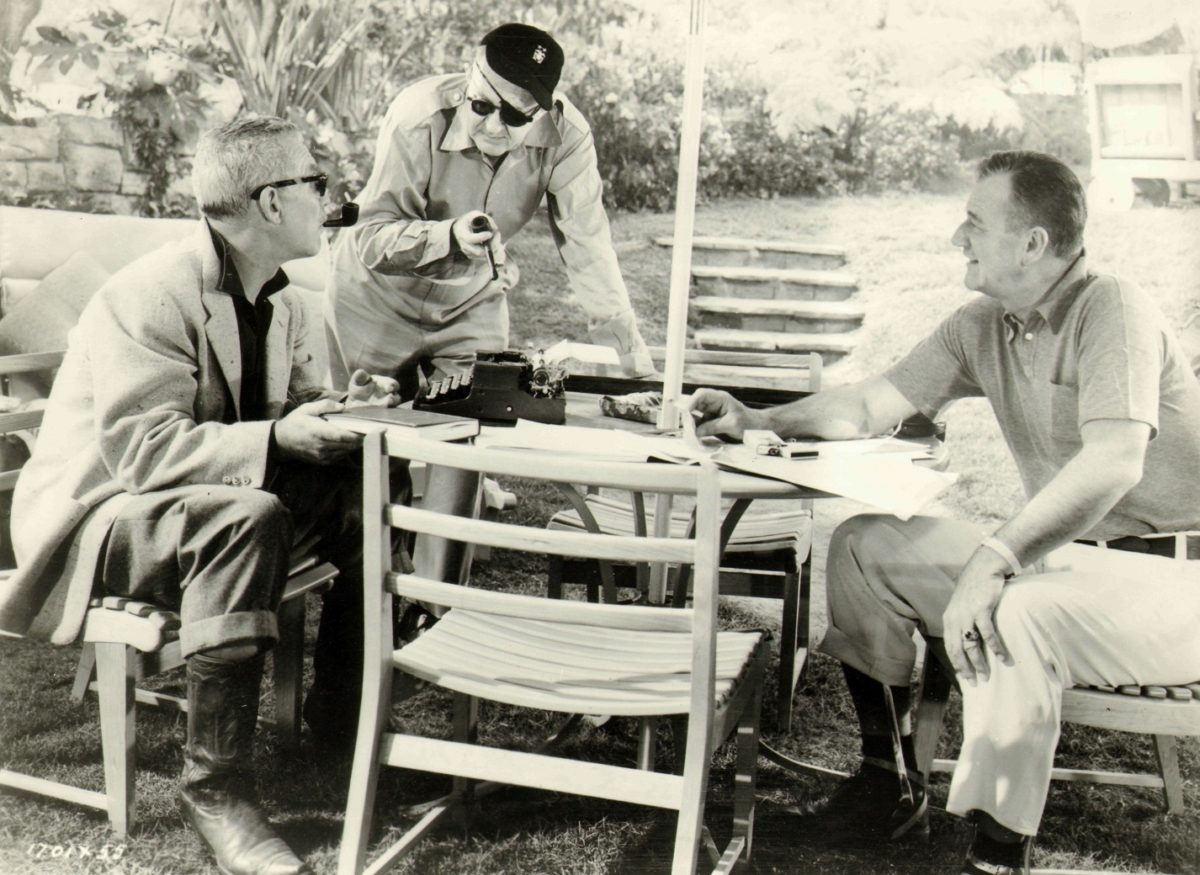
This fear, of being shown up as a fraud, of losing touch with your roots, is not contained within the Ford surrogate. It infests Wead too, after he leaves behind ‘Jughead’ Carson (Dan Dailey) — a comrade, a corpsman and also his nurse — who is delineated as ‘ethnic’ by his humour, escalating love for liquor and distinctly working-class Brooklyn accent. They meet again when Wead is on Broadway and Carson is the taxi driver picking him up after the show. Their conversation mostly consists of a recounting of Carson’s travails, which includes leaving the navy, starting a chicken ranch, watching it fall into ruin and becoming a cabby. The tension is implicit until it is expressed openly, in a question raised by Jughead: “Why didn’t you call?” Why didn’t Spig, as soon as he became a big shot, call up his friend and get him a job? Wead doesn’t have an answer so the tension is maintained, and its release delayed until the final moments, where after having just re-joined the navy, Wead is retired because of a heart attack. As he is being chair lifted from one carrier to another, the music roars triumphantly. Yet the final shot, of Carson watching from a porthole, gives a conflicting impression, as he pierces through all of the pomp with a look of sadness laced with disappointment.
Jia, on the other hand, seems to not have forgotten his old friends. This is documented in the Walter Salles documentary Jia Zhangke, A Guy From Fenyang (2016), which follows Jia as he gets reacquainted with the people and places from his childhood. Though he is greeted warmly everywhere he goes, he wonders out loud at something nagging at him. Namely, the palpable difference in how people treated him when he was a little boy nicknamed ‘Lailai’, versus as the man he is now. Not just a movie director but also a mini mogul who appears on TV. Nevertheless, thanks to Jia’s ingenuity, the passing of time is not merely the grounds for sorrow or warm remembrance. He delivers on both fronts in the documentary, but in his work it manifests in a critical rebounding that becomes more conceptual yet also more personal as the gulf between that ‘guy from Fenyang’ and one of the 21st century’s greatest filmmakers both narrows and widens.
